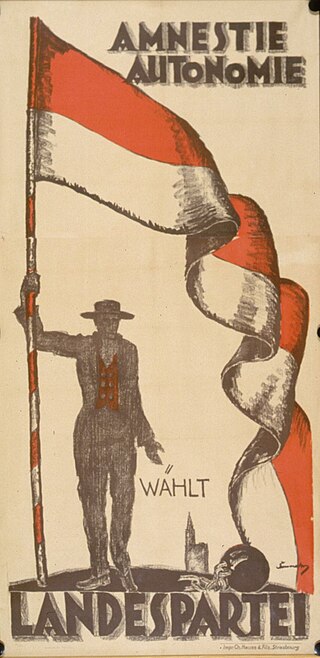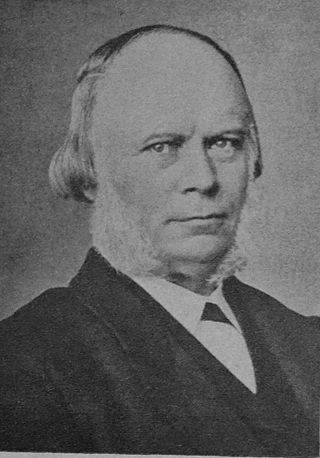Related Research Articles

Alsace–Lorraine, officially the Imperial Territory of Alsace–Lorraine, was a territory of the German Empire, located in modern-day France. It was established in 1871 by the German Empire after it had occupied the region during the Franco-Prussian War. The region was officially ceded to the German Empire in the Treaty of Frankfurt. French resentment about the loss of the territory was one of the contributing factors to World War I. Alsace–Lorraine was formally ceded back to France in 1920 as part of the Treaty of Versailles following Germany's defeat in the war, but already annexed in practice at the war's end in 1918.
The Right Opposition or Right Tendency in the All-Union Communist Party (Bolsheviks) was a label formulated by Joseph Stalin in autumn of 1928 for the opposition against certain measures included within the first five-year plan, an opposition which was led by Nikolai Bukharin, Alexei Rykov, Mikhail Tomsky, and their supporters within the Soviet Union that did not follow the so-called "general line of the party". It is also the name given to "right-wing" critics within the Communist movement internationally, particularly those who coalesced in the International Communist Opposition, regardless of whether they identified with Bukharin and Rykov.
The politics of Vojvodina function within the framework of the autonomous province of Vojvodina, Serbia. The province has a legislative assembly composed of 120 proportionally elected members, and a government composed of a president and cabinet ministers. The current political status of Vojvodina is regulated by the Statute of the Autonomous Province of Vojvodina from 2008.

Jacques Laurent Peirotes was a French and German politician, mayor of Strasbourg from 1919 to 1929.

Doctor Eugène Adolf Ricklin was an Alsatian politician. He was known for his fiery opposition both to German and French assimilationist policies in Alsace.
The Lorrain Republican Union was a Christian democratic party in Moselle, France during the Third Republic. Founded in 1919, the URL became the dominant party in Moselle during the Interwar era. In Alsace, the Popular Republican Union (UPR) was considered the URL's sister party. The URL was much more conservative than the Popular Democratic Party (PDP), the main Christian democratic party in the rest of France at the time.
The Alsatian Workers and Peasants Party, initially the Opposition Communist Party of Alsace-Lorraine, was a political party in Alsace-Lorraine. The party was led by Jean-Pierre Mourer and Charles Hueber. The party was founded in late October 1929 and was a member of the International Communist Opposition until it was expelled from that organisation in 1934 and gradually moved towards pro-Nazi positions.
Bloody Sunday is a name given to political clashes that occurred in Colmar, Alsace, France on August 22, 1926. On that day the French Communist Party and the Colmar section of the Popular Republican Union had organized a joint protest meeting at the Salle des Catherinettes. The theme of the meeting was to denounce measures by the French state against the signatories of the Alsatian autonomist Heimatbund manifesto.
Die Neue Welt was a newspaper issued from Alsace, France. It was founded in the end of January 1921 by Charles Hueber, a local leader of the French Communist Party in Alsace. The newspaper was merged into the l'Humanité d'Alsace-Lorraine, the regional edition of the party newspaper l'Humanité, in 1923.
Freie Presse was a German-language daily newspaper published in Alsace. It was published as Freie Presse für Elsass-Lothringen between 1898 and 1918, and as Freie Presse/La Presse Libre 1919-1939 and 1944–1960. The newspaper, edited by Jacques Peirotes, was one of the most constitently pro-French newspapers of Alsace.
Der Elsässer Bote was a German-language daily newspaper in Alsace, France. Der Elsässer Bote was the organ of the pro-French Catholic party APNA, and was launched in 1928 with financial support from the French state. Dr. Haenggy served as the editor-in-chief of Der Elsässer Bote. As of 1930, Der Elsässer Bote had the largest circulation of all party-affiliated daily newspapers in Bas-Rhin, with a daily circulation of around 18,000. It ceased publication in 1940.

Charles Louis Hueber was an Alsatian politician. He was the mayor of Strasbourg between 1929 and 1935, and a member of the French National Assembly twice.
Elections to the municipal council of Strasbourg were held in France in May 1929 for a six-year term. An autonomist coalition, the Volksfront, defeated an anticlerical and assimilationist coalition of the incumbent socialist mayor, Jacques Peirotes. The Volksfront won 22 seats in the municipal council, with the French Communist Party winning 11 seats, the Autonomist Landespartei five seats, the Popular Republican Union four and the Alsatian Progress Party two seats. The socialist SFIO won four seats and the Democrats seven seats.

The Independent Regional Party for Alsace–Lorraine was a political party in Alsace, France. The party was founded by a group of key supporters of the publication Die Zukunft. The Landespartei represented the radical fringe of the broader Alsatian autonomist movement.

Elections for a new Assembly were held in French colonial Algeria on 4 and 11 April 1948. The new 120-seat Assembly was to be elected by two colleges, each of which would vote for 60 seats; one college represented around 1,500,000 Europeans and Algerian Jews, plus a few thousand "évolué" Muslims, and the second of around 8,000,000 "indigenous" Muslims. The Assembly elections were manipulated by the authorities to ensure a favourable result. Following the victory of the Movement for the Triumph of Democratic Liberties (MTLD) in the 1947 local elections, and with the MTLD and fellow nationalist UDMA set to win a majority in the Second College in the second round of voting, the authorities openly rigged the results in more than two-thirds of seats to ensure the victory of pro-government independents.

The Alsatian Progress Party was a political party in Alsace, France.
The centre-left coalition is a political alliance of political parties in Italy active under several forms and names since 1995, when The Olive Tree was formed under the leadership of Romano Prodi. The centre-left coalition has ruled the country for more than fifteen years between 1996 and 2021; to do so, it had mostly to rely on a big tent that went from the more radical left-wing, which had more weight between 1996 and 2008, to the political centre, which had more weight during the 2010s, and its main parties were also part of grand coalitions and national unity governments.

The Alsace independence movement is a cultural, ideological and political regionalist movement for greater autonomy or outright independence of Alsace.

Eduard von Möller was a Prussian politician. He was Oberpräsident of Hesse-Nassau from 1867 to 1871. He later became Oberpräsident of Alsace-Lorraine from 1871 until the role was replaced by the office of Reichsstatthalter in 1879.
References
- 1 2 3 4 5 Fischer, Christopher J. Alsace to the Alsatians?: Visions and Divisions of Alsatian Regionalism, 1870-1939 . New York: Berghahn Books, 2010. pp. 198-199
- ↑ Fischer, Christopher J. Alsace to the Alsatians?: Visions and Divisions of Alsatian Regionalism, 1870-1939 . New York: Berghahn Books, 2010. pp. 179
- ↑ Callahan, Kevin J., and Sarah Ann Curtis. Views from the Margins: Creating Identities in Modern France . Lincoln: University of Nebraska Press, 2008. p. 146
- 1 2 Hülsen, Bernhard von. Szenenwechsel im Elsass: Theater und Gesellschaft in Straßburg zwischen Deutschland und Frankreich : 1890 - 1944 . Leipzig: Leipziger Universitäts-Verlag, 2003. pp. 169, 264
- ↑ Goodfellow, Samuel. From Communism to Nazism: The Transformation of Alsatian Communists , in Journal of Contemporary History, Vol. 27, No. 2 (Apr., 1992), pp. 231-258